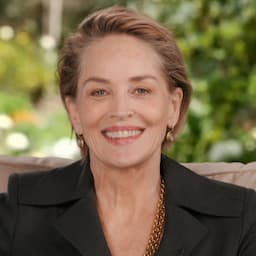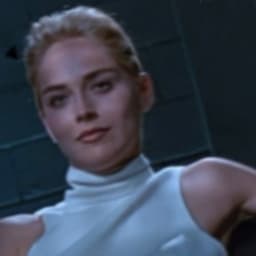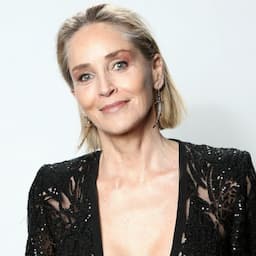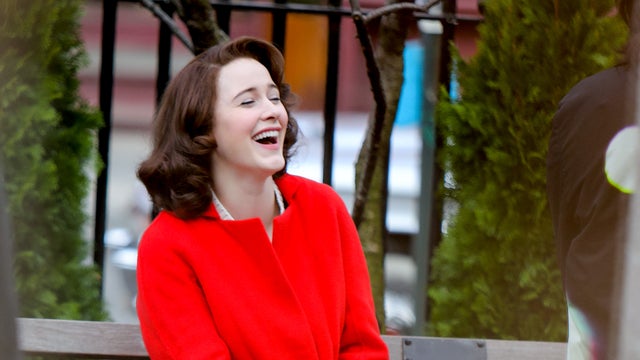'The Beauty of Living Twice' is out now.
Sharon Stone is opening up like never before in her new book, The Beauty of Living Twice. In the powerfully candid memoir, the 63-year-old actress recounts some very painful stories from both her personal and professional life.
Stone does not shy away from openly addressing the physical abuse she says she endured as a child, her medical issues and the harassment she faced in her decades-long career. In addition to talking about her stroke, Stone claims that a doctor performed a medical procedure on her without her knowledge. As for the iconic Basic Instinct scene, Stone shares why she felt misled when it came time to film the erotic moment. Stone also discusses being a mom to Roan, 20, Laird, 15, and Quinn, 14, and admits that temporarily losing custody of her oldest child left her broken.
Here's a look at some of the biggest revelations that Stone shares about her life in The Beauty of Living Twice.
She allegedly suffered abuse as a child
From the time she began grade school to the time she was 14, Stone claims she was physically abused by her father, Joseph Stone, who died in 2009.
She alleges that her father would "yank me down with him or throw me down in front of him." Other times, she claims, "I was dragged through the kitchen to the basement to get the crap strapped out of me with a belt."
"It continued until I was so sure I didn’t do what I was being punished for that I lost all fear, all concern -- in fact, all feeling. I simply saw my father as weak," she writes. "He yelled for me at the bottom of the stairs to come down."
"I walked up to him and said, 'What’s the matter -- do you need to hit me some more to feel like a man?' I was 14. He started to cry. I told him I didn’t love him. That I had never loved him. That I would never love him. I was so cold, so still," Stone continues. "He was so heartbroken. He never hit any one of us again. I was free. From them both. From then on, I was my own guide."
Now, Stone writes that she has "respect" and "love" for her dad.
Reconciling with her mother
Stone also addressed issues she had with her mom growing up and says she eventually reconciled with her, writing that she had to "meet my mother as a person, separate from my childhood experiences and judgments of her, and know her from an adult perspective."
"For now, I am able not only to receive love from my mother but to love my mother in return. I don’t need to know what she knew or blocked out to survive. I don’t need to forgive her, or save her, or help her heal, or get her to help me," she writes. "I am grateful that we both made it here. I respect her for that. She respects me for that. We can look each other in the eye."
"... Today, my mother and I are at the beginning of our relationship," she adds. "Never have understood her and certainly never have had the opportunity for her to mother me now that I’ve entered my 60s and my mother is in her mid-80s."
Despite her alleged experiences, Stone writes that she's "not bitter."
"I am unashamed, I am unblemished, I am pure in my heart and in my soul, I am not bitter, I am not sad, I have no need to be washed clean, I am not angry, I am not here to punish you," she writes.
She received breast implants without her knowledge or consent
In the '90s, Stone underwent a surgery to remove tumors from her breasts. That operation wound up requiring reconstructive surgery, but it didn't turn out how she planned.
"I went to get reconstructive surgery, assuming I would wake up looking exactly as I had before this process. Instead, my plastic surgeon thought that I would look better with bigger, 'better' boobs," she claims. "I left there bandaged, and when unbandaged, discovered that I had a full cup-size bigger breasts, ones that he said 'go better with your hip size -- I’m certain you look better now.'"
"He, in all of his self-determined knowledge, had changed my body without my knowledge or consent," she alleges, adding that the doctor's choice led to experiences that left her "humiliated."
"I went to the underwear department and stood there looking for the most sympathetic-looking woman to tell her I didn’t know how to buy a bra and I didn’t know what size I wore and I didn’t know how to do this thing," she writes. "And I still frankly don’t."
After all of these years, Stone writes that she is still uncertain about a lot of things when it comes to the situation.
"I also don’t know if I should be angry at the now-dead plastic surgeon, whether I should get more reconstructive surgery to look like myself, or whether I should simply be happy I don’t have cancer," she writes. "When I say to the press that I have my original breasts, what I mean is that I have my skin, my nipples, and my health. But still, at some point in all of this, I lost track of myself."
She had multiple negative experiences in the film industry
Throughout her film career, which was something she "always wanted to pursue," Stone says she has been subjected to sexism and inappropriate comments. In her memoir, Stone claims she was misled about the scene in the 1992 film Basic Instinct, which was directed by Paul Verhoeven, where her character, Catherine Tramell, is being interrogated by Detective Nick Curran (Michael Douglas) and proceeds to cross and uncross her legs while wearing a short white dress.
"After we shot Basic Instinct, I got called in to see it. Not on my own with the director, as one would anticipate... but with a room full of agents and lawyers, most of whom had nothing to do with the project," she writes. "That was how I saw my vagina-shot for the first time, long after I’d been told, 'We can’t see anything -- I just need you to remove your panties, as the white is reflecting the light, so we know you have panties on.'"
"Yes, there have been many points of view on this topic, but since I’m the one with the vagina in question, let me say: the other points of view are bulls**t," she continues. "Now, here is the issue. It didn’t matter anymore. It was me and my parts up there. I had decisions to make."
Stone says she "slapped Paul across the face" after seeing the scene, before she called her lawyer, Marty Singer. Stone claims Singer assured her that "they could not release this film as it was." A representative for Verhoeven declined to comment when contacted by ET.
At that point, Stone writes that she was unsure what to do about the situation.
"I knew what film I was doing. For heaven’s sake, I fought for that part, and all that time, only this director had stood up for me. I had to find some way to become objective," she writes. "... I thought and thought and I chose to allow this scene in the film. Why? Because it was correct for the film and for the character; and because, after all, I did it."
Another experience came when, Stone claims, an unnamed director "wouldn’t direct me because I refused to sit in his lap to take direction." This came at a time when her middle son, Laird, was a newborn.
"This #MeToo candidate called me in to work every day for weeks, when Laird was a brand-new baby, and had me go through the works -- hair, makeup, and wardrobe -- and then wouldn’t shoot with me because I refused to sit in his lap and take direction," she claims. "Yes, this was a multimillion-dollar studio film, of which I was the star, and the studio didn’t say or do anything."
Through it all, Stone writes, "I just kept coming to work and spending the day constantly getting retouched in my trailer and being with my baby." The film went on to "bomb," according to Stone, who was at the height of her career at the time.
Another troubling experience Stone writes about is one with a producer, who, Stone claims, "explained to me why I should f**k my co-star so that we could have on-screen chemistry."
The comment, Stone writes, left her thinking, "You guys insisted on this actor when he couldn’t get one whole scene out in the test... Now you think if I f**k him, he will become a fine actor? Nobody’s that good in bed."
"I felt they could have just hired a co-star with talent, someone who could deliver a scene and remember his lines," she writes. "I also felt they could f**k him themselves and leave me out of it. It was my job to act and I said so."
Stone writes that her response was not "popular" and caused her to be "considered difficult" on set.
"Naturally I didn’t you-know-what my co-star; he was baffled enough without me confusing him some more," she writes. "But he did make a few haphazard passes at me in the upcoming weeks, I’m sure spurred on by this genius."
Despite all, Stone remains passionate about acting, though it's not her whole life anymore.
"The acting thing: I do still like it. Actually, I like it more than before. I feel much more comfortable in it, and it’s a whole lot easier to do. I feel less pressure when I do it now, as it is not my entire world," she writes. "I have also had more profound life experiences to bring to it. When the workday is over, good or bad -- and it’s mostly always good -- I go home to a house full of love, so no big deal."
However, Stone admits she's no longer "hungry" for her career.
"People can tell and they like you hungry. Jeez, do they like you hungry. This town is keen for the hunger. It’s like a zoo at feeding time all day long," she writes. "But Mama’s a big animal, so I guess I could have that hungry look anytime. Maybe I could even have the 'I could eat you' look, if you know what I mean. I am proud of my success in my work. It belongs to me, I earned it."
She suffered a stroke and was given one percent chance of survival
In September 2001, Stone began feeling a numbness in her leg and a "terrible pain" in her head, while also suffering from a low body temperature and high blood pressure. She was taken to the hospital where she immediately passed out. Though doctors knew she was suffering from a brain bleed and stroke, they could not determine the cause of the bleed at the time.
"The pain was still so wildly intense that I was put on a 24/7 drip of Dilaudid, which is a kind of synthetic heroin. I was in and out of consciousness," she writes. "… We were now on day five of my brain bleed and I had been coming and going. I had been 'sleeping' more than waking. I had not eaten since the initial incident…After a couple more days, I was unable to get up, stand up, or think clearly and function. I had lost 18 percent of my body mass…The general consensus was that I should go on home and stop faking it."
After Stone had a friend convince the doctors to perform an angiogram, they "found that my right vertebral artery, which is one of the two connecting your head to your back and spine, was torn to a fine shred and I was bleeding into my face, my brain, my head, and my spine." They gave her a one percent chance of survival.
While Stone was "one of the lucky few who beat the odds and walked out of the rubble of the neurological ICU," recovery was anything but easy, with her writing, "piece by piece I lost everything."
"I was walking, a ragged, tilted walk, my right leg dragging a bit, the left side of my face distorted and low, no feeling from the knee up in my left leg. I was talking, not knowing I was stuttering, not realizing that the walls didn’t really have blocks of colors on them," she writes. "I’d lost directional hearing in my right ear and so much weight. I was now a whopping size two, at five feet, eight and a half inches."
"My right ear was so f’ed up that I had to turn my head to the left and watch people’s lips to understand what they were saying… I had an incomplete sense of what was going on around me… I had lost my short-term memory," Stone adds. "… I wouldn’t be able to read for another two years or remember where I’d put down my teacup. But I was up and I was alive."
Stone continued to question if she'd "ever be well enough to work again, but, eventually, she "made an effort." Things began to improve when her friend, record producer Quincy Jones, referred to a doctor who diagnosed her with a brain seizure condition and got her on the correct medication. However, Stone says she still suffers from side effects today.
"As I sit here now, nearly two decades later, the right side of my head still hurts. This is where the brain damage is, where the scarring is. My hearing is back, though sometimes I have to turn my head a bit to shut out the sounds that can interfere with what I am trying to hear," she writes. "I am walking normally. I have all of the feeling again in my left leg, though getting it back was hell... I can write again; that took only a year or so... The stuttering stopped after about four or five months, when I was finally put on the correct anti–brain seizure medication. Same with the colored blocks that appeared in my vision, and the undulation of the floor beneath my feet. My depth perception returned. My memory, both short- and long-term, took longer."
Stone, though, feels that now that her injury is healed, she's "using more of my brain than before."
"I have learned how to access more of my own mind," she writes. "... It took many years and almost dying for me to work my way back to myself. But now that I am myself again, or this self again, I have a happy house, full of laughter and fun."
She "couldn't function" after losing primary custody of her son
Stone adopted her son, Roan, when he was "just a wee babe," and was "deliriously happy" to become a mom after having an abortion as a teenager and suffering three miscarriages later on in life. After she and journalist Phil Bronstein broke up in 2004, she lost primary custody of Roan, who was a toddler at the time.
While Stone writes that she can't disclose why she lost custody, both due to a confidentiality agreement and out of "respect" for Roan, she does explain her feelings on the topic. "I was punished for changing the rules of how we see women, and I understand that by writing this book I could be punished again. But this time I’m not afraid," she writes.
After losing custody, Stone writes that she "couldn't function."
"I just lay on the couch. I was so damn tired," she writes. "I slept every afternoon; I just couldn’t get up."
Her mindset at the time brought about a physical response as well, as Stone found out that she had a prolapsed valve and was anorexic after a trip to the doctor.
"I had stopped eating and fallen apart and hadn’t even noticed," she writes. "I had just lain down and given up. My heart, it seemed, was actually broken."
Stone says the custody loss came after her 2001 stroke, and was one of many things she lost in the wake of her medical issues.
"I lost many things: my career, my savings, my residential custody of my son, my so-called marriage, my place in line in regaining my career, my former ability to simply look at any page of dialogue for two minutes and have instant recall, and a kind of luminous beauty that I hadn’t even realized that I’d had," she writes.
But Stone says she decided to be "no longer afraid," and fought for custody of Roan for more than a decade.
"I fought for my son, put him ahead of getting anything at all back in my life. I did that for 13 years; I played a very long, very difficult game of custody chess in an effort to get him everything I could for his health and well-being," she writes. "Now my home and my family are complete and I am able to re-find success in the rest of my life, as my heart is also complete."
Stone later went on to adopt biological brothers Laird and Quinn. In the acknowledgments of her memoir, Stone writes about where her family is today.
"I want to thank my ex-husband, Phil, and his new wife, Chris, for finding a path to a whole, healthy, and blending family with me," the last line of her acknowledgment section reads. "There is no greater gift."
The Beauty of Living Twice is out now.
RELATED CONTENT:



